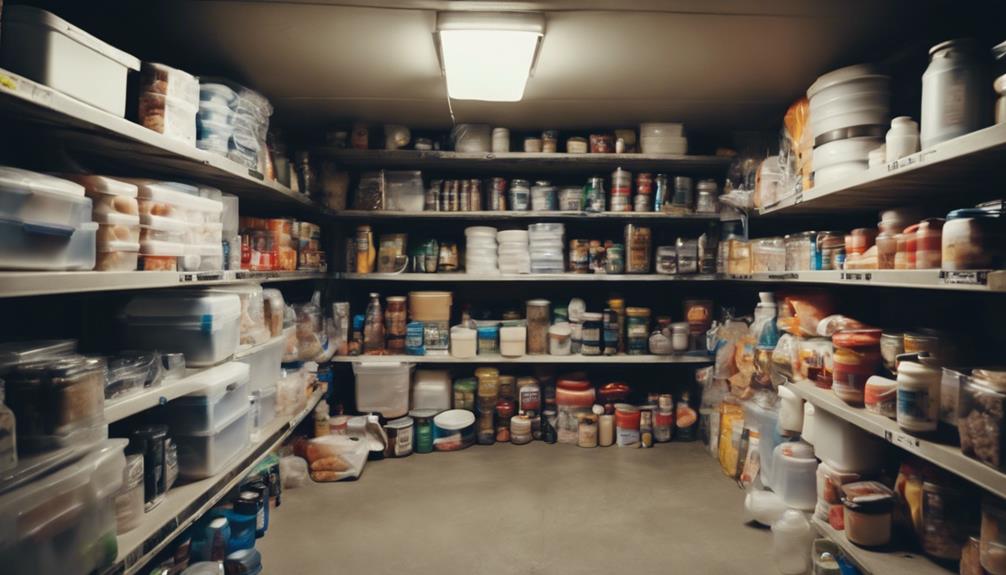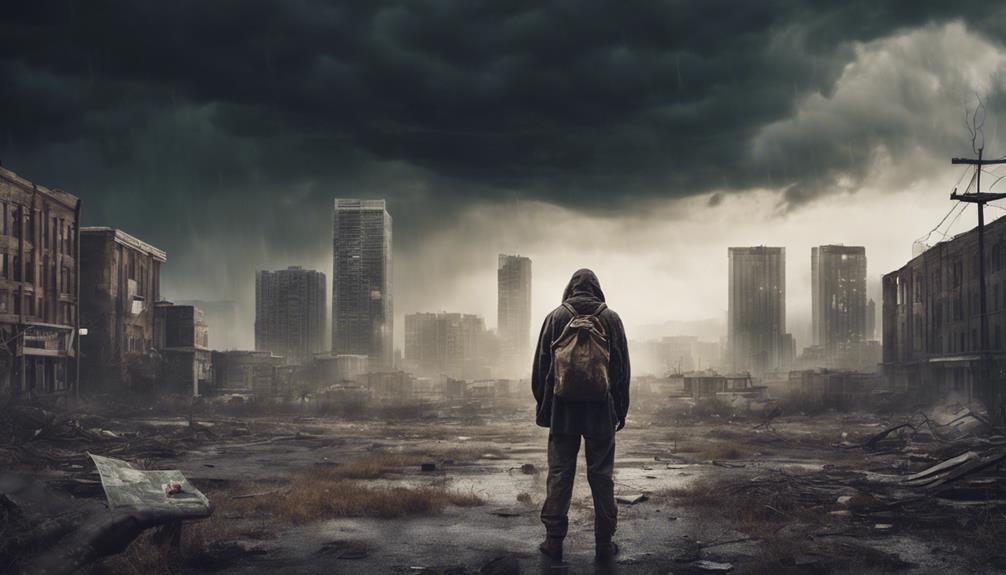Get prepared for any crisis with our Preppers Survival Guide. Stock up on non-perishable food, water, and supplies. Establish communication and first aid plans. Learn basic self-defense and shelter building. Stay calm and develop mental resilience. Prioritize food stockpiling and storage, emergency communication, and first aid readiness. Pack your Bug Out Bag essentials for survival situations. This guide covers all aspects of preparedness to keep you safe and ready for anything.
Key Takeaways
- Stock up on non-perishable food, water, and supplies.
- Establish a communication plan and emergency contacts.
- Learn basic first aid skills and have a kit.
- Practice fire safety measures and have extinguishers.
- Cultivate mental resilience through positive visualization.
Basic Prepping Tips
To begin your prepping journey, start by stocking up on non-perishable food items, water, and essential supplies for emergencies. Survival and preparedness are key, so having a well-rounded supply of emergency supplies is vital. Include items like canned goods, dried fruits, granola bars, and bottled water in your storage.
Additionally, don't forget about a communication plan. Establish a clear method to stay in touch with family members or your prepping group during emergencies. This could involve designated meeting points, emergency contact numbers, or even walkie-talkies.
In times of crisis, having these prepping tips in place can make a significant difference. Being prepared means more than just having the right supplies; it's also about knowing how to use them effectively. Consider learning basic first aid skills and having a well-equipped first aid kit readily available.
Moreover, practice fire safety measures and make sure that fire extinguishers are easily accessible. Stay informed about potential threats and regularly update your emergency preparedness plans to stay one step ahead of any disaster.
Water Storage Techniques

Consider incorporating various water storage techniques to guarantee you have a reliable and safe supply in times of need. Utilizing food-grade containers like barrels or jugs is essential for storing clean water during emergencies. Before storage, make sure water is treated and filtered to prevent contamination and ensure its potability.
To maintain freshness and quality, make it a habit to rotate stored water regularly, especially if using tap water with added chlorine.
Diversifying water storage across multiple locations, such as underground cisterns or rainwater collection systems, provides redundancy in case one source is compromised. Additionally, employing water purification methods like boiling, chemical treatment, or water filters adds extra layers of protection for drinking water during disasters.
Shelter Building Strategies

When building shelters in preparation for survival scenarios, focus on using natural materials like branches, leaves, and tarpaulin to guarantee sturdiness and protection.
Select a suitable location that isn't flood-prone and has good drainage to avoid water accumulation.
Construct shelters such as lean-tos, debris huts, or A-frame shelters using simple yet effective techniques.
Make sure proper insulation to retain body heat, adequate ventilation to prevent condensation, and waterproofing to keep you dry during rainfall.
Understanding these principles is essential for creating shelters that offer protection from harsh weather conditions.
By following these shelter building strategies, preppers can stay warm, dry, and secure, enhancing their chances of survival in emergency situations.
Self-Defense Essentials

You must prioritize your safety by acquiring the necessary skills and tools for self-defense.
Defending your home requires tactical preparedness and strategic thinking.
Understanding how to use self-defense essentials effectively can make a significant difference in a crisis situation.
Defend Your Home
During a crisis, ensuring you have self-defense essentials is vital for safeguarding your home and loved ones. Learning basic self-defense techniques equips you with the necessary skills to protect yourself and your family in emergency situations. It's essential to cultivate situational awareness and understand strategic defense tactics to navigate threatening scenarios effectively.
Securing your home is a fundamental aspect of defense. Fortifying entry points, installing sturdy locks, and reinforcing windows can act as deterrents to potential intruders, enhancing your overall safety.
Additionally, investing in self-defense tools, such as pepper spray or a personal alarm, can provide an added layer of protection and peace of mind.
Tactical Tools Needed
To effectively defend your home and loved ones during a crisis, ensuring you have the right tactical tools is essential for your preparedness. Self-defense essentials such as pepper spray, stun guns, and personal alarms can provide an added layer of security in emergency situations.
Additionally, training in hand-to-hand combat and firearm use can empower you to effectively defend against potential threats that may arise. It's vital to understand situational awareness and de-escalation techniques to avoid confrontations whenever possible.
Developing a well-thought-out self-defense plan and practicing it regularly can greatly boost your confidence and readiness in high-stress scenarios. By incorporating these self-defense essentials and being prepared with the right tactical tools, you can enhance your ability to protect yourself and your loved ones during unexpected emergencies.
Mental Preparedness Tactics

Get ready to enhance your mental readiness with key tactics in the preppers survival guide.
You'll learn how to:
- Stay calm under pressure
- Cultivate a resilience mindset
- Master the art of positive visualization
These strategies will be essential in helping you navigate challenging situations with confidence and determination.
Stay Calm Under Pressure
Managing a sense of calm and focus under pressure is essential for survival in challenging situations, according to mental preparedness tactics outlined in preppers survival guides.
In high-stress situations, cultivating mental resilience through techniques like deep breathing, visualization, and positive self-talk can help you stay calm and make sound decisions. By practicing mindfulness, stress management, and emotional regulation, you can enhance your ability to adapt and problem-solve effectively when faced with adversity.
Keeping a positive mindset is key to handling crisis scenarios with confidence and clarity, reducing the likelihood of panic and promoting rational thinking during disasters. The strategies provided in survival guides aim to equip you with the tools necessary to handle pressure-filled situations, ensuring that you can confront challenges with a composed demeanor and make informed choices when it matters most.
Develop Resilience Mindset
Enhancing mental resilience through visualization exercises, positive self-talk, and mindfulness practices is essential for effectively handling stress and uncertainty in emergency situations, as outlined in preppers survival guides. Developing a resilient mindset involves mastering stress management techniques and emotional regulation to navigate challenging circumstances with clarity and composure. Mental rehearsal plays a key role in preparing for unexpected events, allowing you to make quick decisions under pressure. By building mental resilience through training and self-awareness, you equip yourself with the tools needed to adapt and thrive in high-stress scenarios. Techniques like deep breathing, meditation, and cognitive reframing can help you stay focused and maintain a sense of control amidst chaos.
| Resilient Mindset Tactics | Benefits |
|---|---|
| Visualization exercises | Enhances focus and preparedness |
| Positive self-talk | Boosts confidence and morale |
| Mindfulness practices | Promotes calmness and clarity |
| Stress management techniques | Improves decision-making under pressure |
Practice Positive Visualization
To bolster your mental preparedness in survival situations, practice positive visualization by mentally rehearsing successful scenarios. Positive visualization is a powerful technique that can boost your confidence, enhance your decision-making abilities, and contribute to your overall mental well-being. By envisioning positive outcomes, you can cultivate resilience, stay motivated, and develop a proactive mindset that allows you to adapt swiftly to changing circumstances.
Engaging in regular positive visualization exercises helps you maintain focus, reduce anxiety, and feel more empowered in challenging situations. By visualizing yourself successfully maneuvering through emergencies, you can instill a sense of control and readiness. This proactive approach not only prepares you for potential crises but also strengthens your mental fortitude.
Embracing positive visualization as part of your preparedness routine equips you with the tools needed to face uncertainties with confidence and a resilient attitude.
Food Stockpiling Methods

When stockpiling food as a prepper, prioritize selecting non-perishable items such as canned goods, rice, and pasta. These items have a longer shelf life and can sustain you during emergencies.
To effectively manage your food stockpile, consider the following methods:
- Vacuum Sealing: Use vacuum sealers to remove air from packaging, prolonging the freshness of food items.
- Rotation of Food Supplies: Regularly rotate your stockpile by consuming and replacing older items first to prevent spoilage.
- First In, First Out (FIFO) System: Implement a system where you consume the oldest food items first, ensuring nothing goes to waste.
Emergency Communication Skills

You need to master clear communication channels, effective messaging strategies, and quick response protocols to guarantee your survival in emergencies.
Having alternative communication methods and knowing Morse code can be lifesaving when traditional means fail.
Establishing protocols and practicing drills with your group will enhance coordination and readiness during crises.
Clear Communication Channels
Clear communication channels play an essential role in making sure preppers are effectively connected during emergencies. Developing strong communication skills is vital for preppers to convey important information and coordinate actions efficiently.
To establish effective communication channels, preppers should:
- Invest in reliable means of communication like radios, signaling devices, or mobile phones to stay connected with fellow preppers and emergency services.
- Learn and implement emergency communication protocols to streamline information sharing and response efforts during crises.
- Practice effective communication techniques to guarantee clarity, accuracy, and timeliness in conveying critical updates, safety instructions, and resource coordination.
Effective Messaging Strategies
Effective messaging strategies in emergency communication skills are essential for preppers to guarantee clear and efficient information dissemination during disasters. By honing your communication skills, you can make sure that pivotal details are conveyed accurately to others in your group or community.
Utilizing diverse communication channels, such as radios, smartphones, and signal devices, enhances your preparedness by allowing you to stay connected even in challenging circumstances. It's imperative to establish communication protocols and codes to maintain security and confidentiality, especially when sharing sensitive information during emergencies.
Additionally, conducting regular emergency drills focused on communication will help you practice implementing these strategies in a simulated crisis, ensuring that you're well-prepared to communicate effectively when faced with a real disaster. By mastering effective messaging strategies, you can enhance your ability to coordinate with others and respond efficiently to emergencies.
Quick Response Protocols
Establishing rapid response protocols is essential in emergency communication skills to guarantee fast and efficient information dissemination during crises. Preppers rely on these protocols to make certain clear communication channels are in place, enabling them to relay essential information swiftly.
To enhance quick responses and overall readiness, preppers focus on the following key practices:
- Setting up Communication Networks: Establishing reliable communication networks is critical for preppers to transmit information effectively during emergencies.
- Establishing Codes or Signals: Creating specific codes or signals helps preppers communicate important messages quickly and discreetly, ensuring operational security.
- Practicing Emergency Drills: Regularly conducting emergency drills allows preppers to hone their communication skills, familiarize themselves with protocols, and improve response times in real-life scenarios.
First Aid and Medical Supplies

In preparing for emergencies, ensuring you have adequate first aid and medical supplies is vital for addressing potential health issues effectively. Having a well-equipped first aid kit stocked with essential medical supplies like bandages, antiseptics, and medications can be a lifesaver in emergency situations. This kit should also include items like scissors, tweezers, gloves, and a thermometer to handle a variety of medical needs.
Moreover, it's essential to train yourself in basic first aid techniques and CPR to be better prepared to handle medical emergencies. By being proactive and knowledgeable, you can greatly improve the outcomes for yourself and others in times of crisis.
Regularly checking and replenishing your medical supplies ensures that you're always ready to respond to unexpected medical needs quickly and effectively. Remember, being prepared with the right tools and knowledge can make all the difference when it comes to ensuring the well-being of yourself and your loved ones in challenging situations.
Bug Out Bag Essentials

Make sure your bug out bag is packed with essential items like water, food, first aid supplies, and tools to maximize your survival capabilities.
In an emergency situation, having the right gear can make all the difference. Here are some key essentials to include in your bug out bag:
- Water: Pack portable water filtration systems or purification tablets to guarantee a safe drinking supply.
- Food: Include non-perishable items like energy bars, canned goods, or freeze-dried meals for sustenance.
- First Aid Supplies: Stock up on bandages, antiseptic wipes, pain relievers, and any necessary medications to address injuries or illnesses.
Community Building Strategies

Connect with fellow preppers to strengthen your community and enhance your survival preparedness. Building a community of preppers is essential in the world of survival preparedness. By establishing support networks and fostering collaboration, preppers can increase their chances of survival in various disaster scenarios. This sense of community not only provides mutual support but also allows for the sharing of knowledge, skills, and resources, ultimately leading to better preparedness.
Utilizing the strengths of each individual within the prepping community can create a robust network capable of handling diverse challenges. Here is a breakdown of key community building strategies in prepping:
| Community Building Strategies | Description |
|---|---|
| Establish Support Networks | Connect with like-minded individuals to create a strong support system. |
| Foster Collaboration | Emphasize the importance of working together to enhance survival chances. |
| Promote Mutual Support | Encourage camaraderie and mutual aid among preppers. |
| Share Knowledge and Resources | Exchange information, skills, and supplies for better preparedness. |
Frequently Asked Questions
What Do I Need to Prep for Doomsday?
To prep for doomsday, you need essential supplies like food, water, and medical items. Develop survival skills in first aid, self-defense, and navigation. Create a communication plan and build a network for support. Understand potential threats and regularly update your prepping resources.
How to Begin Being a Prepper?
Assess your risks, create a plan, and build an emergency kit. Learn survival skills and stay informed. Regularly practice drills and seek training to enhance preparedness. Start now to be ready for anything.
How Do I Start Prepping?
Start prepping by creating a personalized emergency plan for your family. Gather supplies like food, water, first aid kits, and tools. Learn survival skills such as fire-making and shelter building. Practice your plan regularly for readiness.
Is It a Good Idea to Start Prepping?
Yes, starting prepping is a good idea. It helps you prepare for potential disasters, acquire essential supplies, and develop survival skills. Being proactive guarantees you're ready for emergencies, providing peace of mind and security.
What Are the Essential Resources for Urban Preppers in the Preppers Survival Guide?
Urban preppers must ensure they have essential resources on hand. The Preppers Survival Guide outlines how to prepare urban areas, emphasizing the need for food and water storage, first aid kits, and emergency tools. Additionally, having a communication plan, shelter options, and self-defense skills are crucial for urban survival.
Conclusion
To sum up, always remember to stay prepared for any emergency situation.
Did you know that according to FEMA, only 39% of Americans have an emergency plan in place?
By following the tips and strategies outlined in this preppers survival guide, you can guarantee that you and your loved ones are ready for whatever may come your way.
Stay safe, stay informed, and stay prepared!










